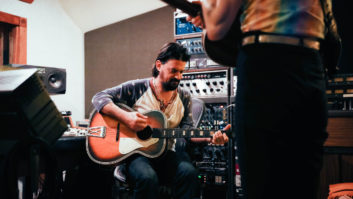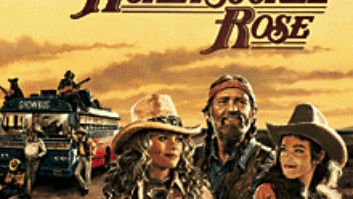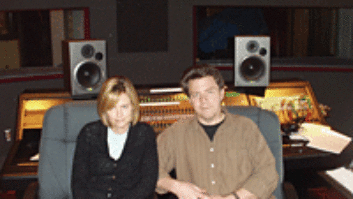It’s one thing to follow in the footsteps of a loved one, but it’s quite another when that loved one is Waylon Jennings, a legend who has passed on after a genre-defining career that has touched millions of fans around the globe. Yet Jessi Colter opted to walk down that path 20-plus years after releasing her previous solo album when she sat across the table from producer Don Was and asked, “Are you interested in hearing what I’ve been working on?”
“I said, ‘Yeah, let’s put that on,’” Was recalls of the songs he heard after a lunch that took place on the one-year anniversary of Jennings’ death. “The first thing she played was ‘You Took Me By Surprise,’ and it was staggering. She totally took me by surprise, and she kept playing me new songs. I’m hard-pressed to find a precedent for someone at that point in their lives coming out of left field with material of that caliber. I can’t think of anybody.”
Not that Colter was a novice — she has had a long career of her own, though mostly in the shadow of her famous husband, with whom she performed for many years. Still, this creative burst was unexpected. While there were dozens of songs written, Colter and Was winnowed the material down to include such knockout tracks as the haunting “Starman,” “The Canyon” and a cover of Bob Dylan’s “Rainy Day Women #12 & 35” for the 12-track album Out of the Ashes, which came out on the Shout Factory label in late spring to considerable acclaim. The key to picking songs for this collection, Was explains, was making sure that they were true to a theme. “The songs were written over a period of time, and I saw this person emerging from not just a tragic situation of loss, but also a person finding her own legs again after being in a partnership for a long time. Each time we’d get together to listen to songs, she was farther along the path and therefore writing about it.
“I thought that you could actually sequence the thing in order. That doesn’t necessarily work,” he continues with a laugh, “but it was a nice way to build a temporary spine for the album.”
He was also careful that subjects didn’t get repetitive: “If there were two songs that dealt with a certain emotion or a certain situation, then we only used one. I think there were a couple of songs about being somewhat tentative about jumping into a new relationship and we chose one.”
The original songs that Was heard on that first day in Los Angeles were recorded at Colter’s house by Mike Breen, who works in Phoenix, where she is currently living. “I started going to her house on and off for about two years,” Breen says. “I would just mike up her piano and her. I think at the first session, [cellist] Jenny Lynn Young was there and a couple of times Ray Herndon was there playing guitar and singing. I was really there trying to capture these brand-new songs as she would sit at the piano and start playing them.”
Breen used a Roland VS-1680 to record the tracks. He put a couple of Shure KSM 32s on the piano and a Marshall MXL tube condenser microphone on her vocals. After each day, he would dump the tracks from the VS-1680 into Pro Tools, set up a rough mix and then send it back to her. Colter played a restored 1910 Chickering & Sons grand piano.
During those early dates, Breen recalls, the sessions were very relaxed. “After lunch, we’d go in and she would sit down at the piano,” he says. “A lot of times, I wouldn’t even know she was going to start a song, so I would try to have the machine running right as she sat down because she would just kind of start playing and this beautiful song would come out. A lot of the stuff that we did was first or second takes, rarely more than three. My main thing was being ready for her to do her thing.”
The tracks that Breen and Colter worked on at her home formed the backbone for what Out of the Ashes would become. Once Was got involved on a full-time basis, the project was tracked mostly at Cartee Day Studios in Nashville — where Jennings had done the bulk of his recording over the years. In addition to Cartee, sessions took place at CarBarn in nearby Franklin and Starstruck in Nashville, with engineers Al Cartee, Steve Crowder, J.R. Rodriguez and Barney Robertson.
In the studio, Colter and Was were joined by a cast of local all-star musicians that included guitarist Tony Joe White, who wrote “Out of the Rain,” guitarist Reggie Young, drummer Ritchie Albright, steel and Dobro player Robby Turner and saxophonist Jim Horn. Colter calls them her “musical family.” Her son, Shooter Jennings, also worked on the collection, playing and singing on the track “Please Carry Me Home.”
“It was fairly obvious who to choose,” Was reports. “Everyone on the session pretty much had a lot of history with her. There was a lot of love in the room, and it was a labor of love for everybody.”
Was includes himself in that list; he played stand-up bass while producing, a task that turned out to be a bit of a challenge: “There were times in choosing the initial takes where I had to turn the bass off. The tendency is to listen to yourself. Even if you were being objective, you would overstate the importance of the bass part in choosing the take. So I would turn the bass off and listen to everything else, particularly the vocals. Then, if it was great, I would turn the bass up and listen to it. If I had to fix something, I would fix it, but if the vocal is great, then you choose the take for that reason.”
That was especially true, Was says, working on sessions with a singer like Colter, where emotion trumped perfection every time. “Part of the deal when you’re producing a Jessi Colter record is knowing when not to get too slick,” Was notes. “Like ‘His Eye Is on the Sparrow’ wasn’t even intended to be recorded. She was just warming up and, fortunately, the engineer kicked it into Record. That’s a really stirring performance. Now there’s stuff all over the place — fingernails and stuff being moved and people noodling — but that spontaneous moment is what makes it effective.”
In fact, there were a handful of songs, Was reports, that didn’t need much work. “I had no idea what to add to ‘You Took Me By Surprise,’” he admits. “We did a little bit of work to it, but as she played it to me that day, I thought it was perfect.” On the song “Never Got Over You,” Was says, “We added some things to it and remixed it, but it was of the moment. Not only that, but you couldn’t take the vocals out of the mics. There’s a tambourine that comes in really loud at the end and that’s just what happened in the room. I think it was pretty much a live take that was augmented with a few things. That happens a lot on that record.”
And, according to Colter, that was the design all along. “I’m messy and I love some of the great records that were done messy,” she says with a laugh. “I think Exile on Main Street [by the Rolling Stones, 1972] is awesome. It was a mess. And some of Bob Dylan’s early stuff was a mess. It was true to the moment, mistakes and all. Now, with digital, everything can be so perfect, but that’s pretty boring. You know — try to be good, but you don’t have to be too good.”
With Out of the Ashes, Colter returns to the music business and plans on sticking around: “I’ve got two albums in my library,” she says, “and I’ve continued to write, sing and cut.”





